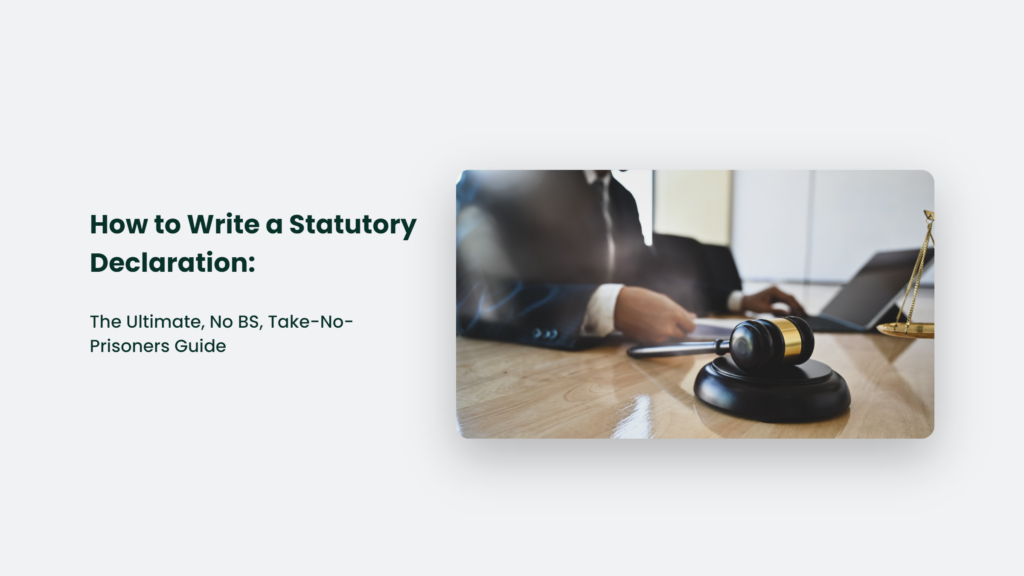

How to Write a Statutory Declaration: The Ultimate, No BS, Take-No-Prisoners Guide

As Seen On
Wham, bam, thank you, ma’am! Here you are, cruising on the information highway, searching for that juicy scoop on “how to write a statutory declaration”. Well, buckle up, my friend! Your search ends right here, right now.

Why The Hell Should You Listen to Me?
You’re probably thinking, “Who is this writer, and why should I listen to them?” Fair enough. I’m a humble writer trying to make the Internet less confusing. We’ve all gotta start somewhere, right?
Just like the godfather of pop art, Andy Warhol, once said: “Being good in business is the most fascinating kind of art.” But who are we kidding, right? You’re not here for my life story. You want the goods, the golden nuggets of wisdom. And I’m here to deliver.
The Inception: What is a Statutory Declaration?
A statutory declaration. It sounds like something from a Sherlock Holmes novel, doesn’t it? Well, it’s not. It’s a legal document typically used in court proceedings or for government processes. According to the Oxford Law Dictionary, the dry definition is a “written statement which allows a person to declare something to be true, in the presence of an authorised witness”.
Now, isn’t that just as exciting as watching paint dry? The good news is, writing a statutory declaration doesn’t have to be a journey into the abyss of complete boredom.
Why Should You Care About Writing a Statutory Declaration?
You might be asking, “Why should I give a damn about writing a statutory declaration?” I hear you. But imagine, for a moment, you’re stuck in a situation where your word isn’t enough. You need to provide proof or evidence to support your case.
You may have lost your passport while backpacking in the Australian Outback and need assistance to apply for a new one. Or maybe you’re a witness to a crime, and your statement could make the difference between justice served and a criminal walking free.
In these situations, having a well-written, witness a statutory declaration, can save your bacon. It’s like wearing a parachute when you’re skydiving; you hope you’ll never need it, but it’s good to have it just in case.
How to Write a Statutory Declaration: Elements
Writing a statutory declaration is as easy as falling off a bike. And much less painful, I assure you. Let’s break it down:
- Title and Introduction: This is where you formally introduce yourself and state why you’re writing the declaration. No need for the fluff or your life story. Keep it short and crisp like a fresh salad.
- Body: Here’s where you present the facts. Remember, this isn’t the place for your opinions or emotional rants. Stick to the facts like a fly-on honey.
- Conclusion: Wrap up your declaration by reaffirming the truthfulness of your statements.
- Date and Signature: Seal the deal by signing and dating the document in the presence of an authorised witness.
Now, let’s put this into context with a real-life example. Here’s a statutory declaration written by Jane Doe, who lost her passport:
Title: Statutory Declaration by Jane Doe Regarding Lost Passport
I, Jane Doe, of address 123 Fake Street, Stateville, do solemnly and sincerely declare as follows:
I lost my passport on the 15th of June, 2023, while travelling in Australia. I have taken all reasonable steps to recover it, including reporting it to the local authorities, but have been unsuccessful.
I make this solemn declaration conscientiously believing and declaring the same to be true and by virtue of the provisions of the Statutory Declarations Act.
Dated this 20th day of June 2023.
Jane Doe
Witnessed by: [insert witness name and title]
Bam! A clear, factual, and straightforward statutory declaration.
The Do’s and Don’ts of Writing a Statutory Declaration
So, are you ready to pen down and sign your first statutory declaration? Hold your horses! Here are some quick-fire do’s and don’ts to ensure you’re not going off track:
Do’s:
- Be Honest: This isn’t a Hollywood script. Stick to the truth, even if it’s not as glamorous.
- Use Plain Language: No need for flowery prose or cryptic riddles. The simpler, the better.
- Be Concise: No one wants to read a novel. Keep your sentences short and to the point.
Don’ts:
- Don’t Speculate: This is not the time to play detective. Stick to what you know.
- Don’t Exaggerate: The truth doesn’t need embellishment.
- Don’t Ignore Formatting: A well-structured document makes reading a pleasure.
In the eloquent words of George Orwell, “If it is possible to cut a word out, always cut it out.” The same applies to writing statutory declarations.
Frequently Asked Questions:
Is a statutory declaration the same as an affidavit?
Although both are legal documents where you affirm the truth of certain information, they are not the same. An affidavit is usually used to confirm something within court proceedings, is sworn before a judge, and carries more weight.
A statutory declaration is used outside of court, sworn before an authorized witness, and while it is legally binding, in law it is generally used for less critical matters than an affidavit.
Can a statutory declaration be done electronically?
This depends on the jurisdiction. Some places accept electronically completed and signed statutory declarations, while others might require a physical, hard-copy statutory declaration witness too. Always check with the relevant authority to make sure.
The Bottom Line:
In the spirit of Mark Twain, who said, “The secret of getting ahead is getting started,” I’m going to leave you to get started on the form of your statutory declaration.
So, roll up your sleeves and dig in. You’re now armed with all the knowledge you need to write a statutory declaration that would make even a seasoned lawyer nod in approval.
Remember, the pen is mightier than the sword. Use it wisely; use it well. And who knows? You may discover a hidden talent for legal documents that you never knew you had.
Go forth and declare, my friend!
Konger
Up until working with Casey, we had only had poor to mediocre experiences outsourcing work to agencies. Casey & the team at CJ&CO are the exception to the rule.
Communication was beyond great, his understanding of our vision was phenomenal, and instead of needing babysitting like the other agencies we worked with, he was not only completely dependable but also gave us sound suggestions on how to get better results, at the risk of us not needing him for the initial job we requested (absolute gem).
This has truly been the first time we worked with someone outside of our business that quickly grasped our vision, and that I could completely forget about and would still deliver above expectations.
I honestly can't wait to work in many more projects together!
Disclaimer
*The information this blog provides is for general informational purposes only and is not intended as financial or professional advice. The information may not reflect current developments and may be changed or updated without notice. Any opinions expressed on this blog are the author’s own and do not necessarily reflect the views of the author’s employer or any other organization. You should not act or rely on any information contained in this blog without first seeking the advice of a professional. No representation or warranty, express or implied, is made as to the accuracy or completeness of the information contained in this blog. The author and affiliated parties assume no liability for any errors or omissions.

